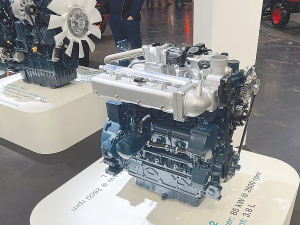Kubota last month used the UK LAMMA Show to test the water with its new 200hp, four-cylinder 09-series diesel engines.
Said to be targeted at the likes of self-propelled sprayer and mixer wagon manufacturers, while also suitable for static installations such as gensets and irrigation pumps, the 5.0-litre 9-series has already been a success in the construction sector for several years.
Having tweaked the power and torque characteristics to suit ag and forestry applications, the maximum output of 210hp occurs at 2200rpm, which the company says is well within the tested tolerances of the engine.
For those users that think that 200+hp is too much out of a four cylinder, Kubota says the block’s modular format means another two cylinders can be added should extra ‘boogie’ be required at some point. Indeed, when the 09-series first broke cover in 2017, there was a 7.5-litre six-pot in the line-up, so it might be a case of watch this space.
In other news, the company also showcased a 3.8-litre hydrogen-fuelled power-plant, currently under testing with Japanese genset maker Denyo. The unit is based on Kubota’s existing spark-ignition engines used in forklifts and usually run on LPG, methane or petrol.
To deal with hydrogen’s lower power density and burn characteristics, a wastegate turbocharger has been added, alongside extensive modification to the manifolds and injectors.
The company notes that, for now, the biggest challenge remains around on-board fuel storage.



















